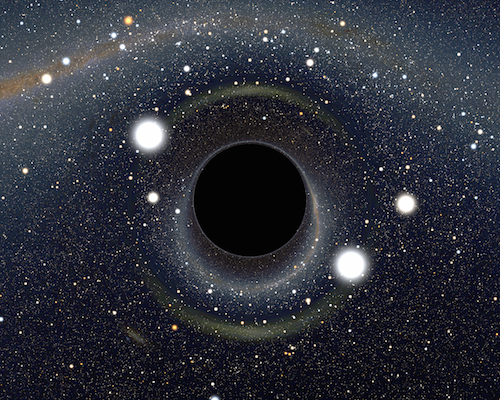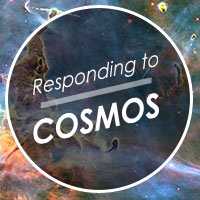 Physics, Earth & Space
Physics, Earth & Space
Cosmos Episode Four: Fewer Errors of Commission, More Errors of Omission

As the fourth episode of Cosmos began yesterday evening, I was enjoying Neil deGrasse Tyson’s CGI-based tour of our universe, and thought, “This is what Cosmos should have been — pure science, spectacular visual effects, and no contrived potshots at religion. This is the perfect recipe to get the public interested in science!” Had Cosmos‘s first four episodes stuck to that science-focused recipe, I would have had very little negative to say. But they didn’t. Knowing how Cosmos had already decided to “get ideological” in its other episodes, what’s noteworthy about last night’s episode isn’t just what it did say, but what it didn’t say.
Cosmos episode four takes viewers on another tour of cosmic history, explaining what happened at various stages after the big bang, especially with regards to light. For the most part, it followed the “recipe” more closely than other episodes — which is a good thing — and again reflected what Cosmos should have been. Towards the end, there is a striking animated scene where Tyson’s spaceship approaches, and then passes into, a black hole. Science-wise, it’s a fascinating scene. But then Tyson says, “Maybe that’s how our cosmos came to be,” suggesting that our universe exists inside a black hole inside of another universe, which itself is a black whole inside of another universe, and so on, and so on. He admits that this idea is completely “speculative.” But there’s a not-so-hidden motivation here — he wants to lend credence to the “multiverse” hypothesis. Why is that?
Since this episode of Cosmos reviewed the development of the universe, it would have been an ideal opportunity to mention the fact that many prominent physicists believe the laws of the universe are finely-tuned to allow for life to exist. But there was no mention of this, nor was there any mention that Nobel laureate Charles Townes thinks this “fine-tuning” points to intelligent design:
Intelligent design, as one sees it from a scientific point of view, seems to be quite real. This is a very special universe: it’s remarkable that it came out just this way. If the laws of physics weren’t just the way they are, we couldn’t be here at all. The sun couldn’t be there, the laws of gravity and nuclear laws and magnetic theory, quantum mechanics, and so on have to be just the way they are for us to be here.
(‘Explore as much as we can’: Nobel Prize winner Charles Townes on evolution, intelligent design, and the meaning of life)
But of course the entire motive behind proposing the multiverse is to escape the improbability of our finely-tuned universe. Charles Townes continues:
Some scientists argue that “well, there’s an enormous number of universes and each one is a little different. This one just happened to turn out right.” Well, that’s a postulate, and it’s a pretty fantastic postulate – it assumes there really are an enormous number of universes and that the laws could be different for each of them. The other possibility is that ours was planned, and that’s why it has come out so specially.
Cosmos decides to endorse something like the “fantastic postulate,” and doesn’t even mention the possibility that intelligent design is a viable way, according to some very prominent scientists, to explain cosmic fine-tuning.
And there were more omissions. In the previous episode, Tyson had inaccurately claimed that the religious beliefs of early founders of science like Isaac Newton didn’t do anything to positively foster scientific discovery. This latest episode covers some additional giants from the annals of science, such as Michael Faraday and James Clerk Maxwell, but again omits any mention of their strong, positive religious influences. Ian Hutchinson, MIT Professor of Nuclear Science and Engineering, explains how Faraday and Maxwell were committed Christians:
Two great British scientists dominate the intellectual landscape of electrical science, and indeed all of physics, in the nineteenth century, Michael Faraday and James Clerk Maxwell. It would be hard to imagine two more contrasting personalities.
Faraday was English; Maxwell Scottish. Faraday was the son of a poor blacksmith; Maxwell’s father had inherited a substantial estate and hardly needed to practice the law in which he had been trained. Faraday had no formal education; Maxwell had the finest education available. Faraday never held a university position; Maxwell held professorships at three of the major British universities. Faraday was one of the most popular scientific lecturers of his day; Maxwell gained a poor reputation in the classroom. Faraday knew practically no formal mathematics; Maxwell was one of the finest mathematicians of his time. Faraday’s research dominated electromagnetic experiments; Maxwell’s electromagnetic theory. The contrasts between these men could be multiplied on and on. Yet they had one experience in common. Both were committed Christians.
In another article, Hutchinson explains that Faraday’s inspiration to discover intelligible laws of nature came from his “metaphysical presuppositions that directed his research”:
Faraday believed that in his scientific researches he was reading the book of nature, which pointed to its creator, and he delighted in it: ‘for the book of nature, which we have to read is written by the finger of God’.
One example of the influence of his theological perspective on his science is Faraday’s preoccupation with nature’s laws. ‘God has been pleased to work in his material creation by laws’, he remarked, and ‘the Creator governs his material works by definite laws resulting from the forces impressed on matter.’ This is part of the designer’s art: ‘How wonderful is to me the simplicity of nature when we rightly interpret her laws’. But, as Cantor points out, ‘the consistency and simplicity of nature were not only conclusions that Faraday drew from his scientific work but they were also metaphysical presuppositions that directed his research.’ He sought the unifying laws relating the forces of the world, and was highly successful in respect of electricity, magnetism, and light. His program was less successful in attempting to unify gravity and electricity, for which failure he may readily be forgiven, since 150 years later we still don’t know how to do that!
Another guiding principle of much of Faraday’s thought finds its motivation in a conception of creation as a divinely planned economy. It is the principle of ‘conservation of force’. This rather unclear concept appears at times to be about conservation of energy (remember that this predates Joule’s demonstrations of the mechanical equivalence of heat); at others it appears to be about the divergencelessness of lines of force. Despite Faraday’s lack of clarity, the concept was a driving ideal behind his championing of the reality of lines of force, and hence of the foundations of field theory.
Tyson notes that Faraday discovered these invisible fields of force, helping us explain how gravity works. But of course he didn’t say anything about how religion played a positive role in Faraday’s scientific thinking.
Then, Tyson notes that James Clerk Maxwell “translated Faraday’s idea about fields of electricity and magnetism into mathematical laws.” Again, Tyson fails to mention Maxwell’s deep religious faith. And again, professor Hutchinson explains what Cosmos won’t. He quotes Maxwell explaining how his Christian faith allows him to discover what’s found in nature:
Now my great plan, which was conceived of old, … is to let nothing be willfully left unexamined. Nothing is to be holy ground consecrated to Stationary Faith, whether positive or negative. All fallow land is to be ploughed up and a regular system of rotation followed. … Never hide anything, be it weed or no, nor seem to wish it hidden. … Again I assert the Right of Trespass on any plot of Holy Ground which any man has set apart. … Now I am convinced that no one but a Christian can actually purge his land of these holy spots. … I do not say that no Christians have enclosed places of this sort. Many have a great deal, and every one has some. But there are extensive and important tracts in the territory of the Scoffer, the Pantheist, the Quietist, Formalist, Dogmatist, Sensualist, and the rest, which are openly and solemnly Tabooed. …
Christianity – that is, the religion of the Bible – is the only scheme or form of belief which disavows any possessions on such a tenure. Here alone all is free. You may fly to the ends of the world and find no God but the Author of Salvation. You may search the Scriptures and not find a text to stop you in your explorations. …
The Old Testament and the Mosaic Law and Judaism are commonly supposed to be “Tabooed” by the orthodox. Sceptics pretend to have read them, and have found certain witty objections … which too many of the orthodox unread admit, and shut up the subject as haunted. But a Candle is coming to drive out all Ghosts and Bugbears. Let us follow the light.
What a striking quote to end a review of another episode of Cosmos. Throughout the series, Neil deGrasse Tyson repeatedly alludes back to the rhetoric of Carl Sagan, casting science as the “light” which helps us understand our world, freeing us from the darkness of religion. Driven by a materialistic agenda, Cosmos shuts up as haunted the tabooed territory of religion’s positive influence on the development of science.
Here’s to following in James Clerk Maxwell’s footsteps, shining light on what Cosmos is refusing to tell its viewers.
